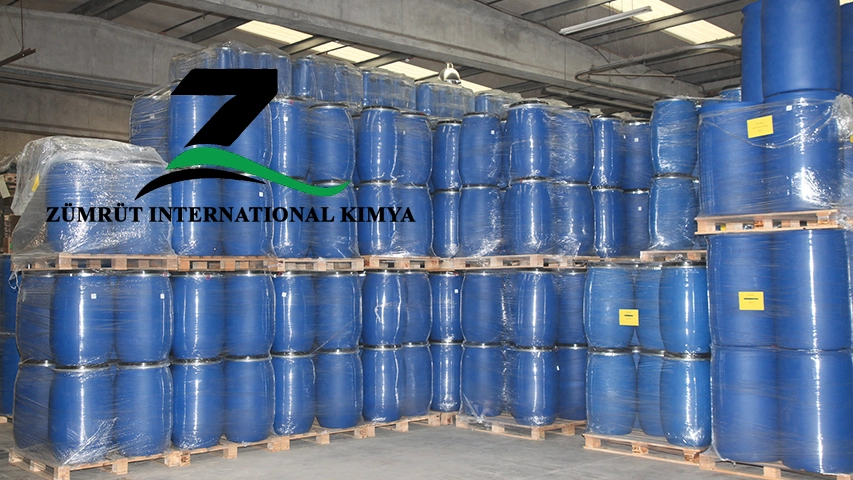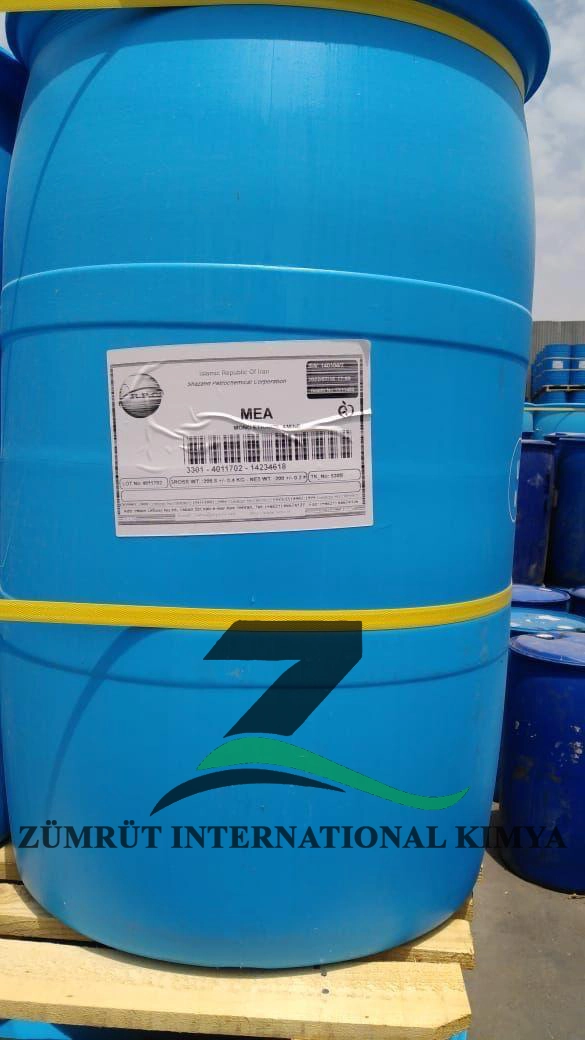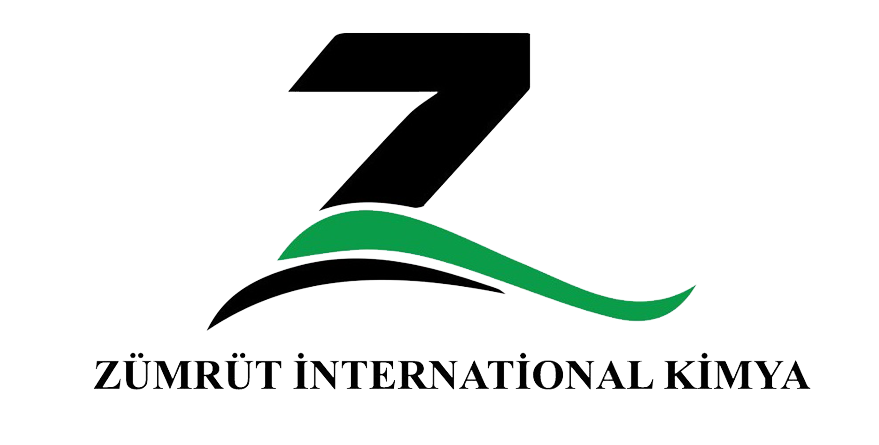Supplier of Monoethanolamine-MEA From Turkey and Dubai UAE

What is MEA?
Monoethanolamine (MEA), chemically known as 2-aminoethanol or ethanolamine, is a primary amine with the formula C₂H₇NO. It is produced by reacting ethylene oxide with ammonia, resulting in a compound that bridges organic and inorganic chemistry. MEA’s dual functionality (amine and hydroxyl groups) enables its use in gas scrubbing, surfactants, and pH adjustment.
ZÜMRÜT International Kimya Co. supplies high-purity MEA tailored to industrial demands, ensuring compliance with global standards.
Chemical Properties and Characteristics
Physical and Chemical Traits
- Appearance: Clear, colorless liquid with a mild ammonia-like odor.
- Boiling Point: 170°C (338°F).
- Solubility: Miscible in water, alcohols, and polar solvents.
- pH: Strongly alkaline (pH ~12 in aqueous solutions).
Functional Advantages
MEA’s reactive amine group allows it to neutralize acids, absorb CO₂ and H₂S in gas streams, and form stable salts. Its hydroxyl group enhances solubility, making it ideal for emulsifiers and detergents.
Molecular Formula: C₂H₇NO, combining amine and alcohol groups.
- Alkalinity: Reacts with acids to form salts.
- Amphoteric Behavior: Acts as both an acid and a base.
- Reactivity: Ideal for synthesis due to its bifunctional structure.
Monoethanolamine Grades
| Grade | Purity | Key Applications |
|---|---|---|
| Industrial | ≥99% | Gas sweetening, chemical manufacturing |
| Technical | 95–99% | Detergents, emulsifiers, textiles |
| Pharmaceutical | ≥99% | Cosmetics, topical medications |
| Reagent | ≥99.5% | Lab research, analytical testing |
| Low-Freeze | ~99% | Cold-climate gas treatment |
| Agricultural | 85–95% | Herbicides, pesticides, fertilizers |
Key Considerations in Selecting MEA Grades:
- Purity Needs: Pharmaceuticals demand ultra-high purity (Pharmaceutical/Reagent Grade).
- Environment: Low-Freeze Grade for cold climates.
- Cost Efficiency: Technical/Agricultural Grades for non-critical applications.

Applications of MEA in Different Industries
Gas Treatment
MEA is the gold standard for CO₂ capture in natural gas processing and power plants. It reacts with acidic gases, forming water-soluble salts for easy removal.
Cosmetics and Personal Care
In shampoos and lotions, MEA acts as a pH adjuster and emulsifier. Its low toxicity makes it safe for skincare (FDA-approved).
Pharmaceuticals
MEA stabilizes active ingredients in ointments and inhalers. It’s also used in diagnostic reagents.
Agrochemicals
As a corrosion inhibitor and surfactant, MEA enhances herbicide and pesticide efficacy.
Textiles and Coatings
MEA serves as a dye dispersant and curing agent in epoxy resins.
How is Monoethanolamine (MEA) Produced?
Production Process of MEA
MEA is synthesized via a two-step reaction:
- Ethylene Oxide and Ammonia Reaction:
Ethylene oxide reacts with excess ammonia under controlled pressure (50–150 psi) and temperature (60–150°C).C₂H₄O + NH₃ → HOCH₂CH₂NH₂ (MEA)
- Distillation and Purification:
The crude mixture undergoes fractional distillation to isolate MEA from diethanolamine (DEA) and triethanolamine (TEA).
The difference between MEA AND MEG
MEA and MEG are both industrial chemicals but with key differences. MEA (Monoethanolamine) is more complex, has a higher viscosity, and excels in gas treatment and cleaning. MEG (Mono ethylene Glycol) is simpler, thinner, and commonly used in antifreeze and coolants.
| Feature | MEA (Monoethanolamine) | MEG (Monoethylene Glycol) |
|---|---|---|
| Structure | C₂H₇NO (amine + alcohol) | C₂H₆O₂ (diol) |
| Viscosity | Higher | Lower (water-like) |
| Key Uses | Gas treatment, detergents | Antifreeze, coolants |
| Hygroscopicity | High | Moderate |
Packaging and Storage Recommendations
Packaging Options
- HDPE Drums (25–200 kg): Ideal for small-scale buyers.
- ISO Tanks (20,000 L): Cost-effective for bulk shipments.
Storage Guidelines
- Store in cool, dry areas (<30°C) away from oxidizers.
- Use nitrogen padding to prevent moisture absorption.
- Avoid aluminum containers (risk of corrosion).
ZÜMRÜT International Kimya Co. offers customized packaging solutions to ensure product integrity.
Safety Handling and Environmental Considerations
Safety Protocols
- PPE Required: Gloves, goggles, and respirators.
- Ventilation: Use fume hoods to avoid vapor inhalation.
- Spill Management: Neutralize with weak acids (e.g., acetic acid) and absorb with inert materials.
Environmental Impact
MEA is readily biodegradable (OECD 301F) but toxic to aquatic life at high concentrations. Always adhere to local disposal regulations.
TECHNICAL DATASHEET
| Content | Unit | Anhydrous | 40% solution | 45% solution | 50% solution |
|---|---|---|---|---|---|
| MMA | % | 99.50 min. | 40.00 min. | 45.00 min. | 50.00 min. |
| Water | % | 00.20 max. | 60.00 max. | 55.00 max. | 50.00 max. |
| Ammonia | % | 00.05 max. | 00.03 max. | 0.03 max. | 0.03 max. |
| Other amines / noi | % | 00.30 max. | 00.20 max. | 00.20 max. | 00.20 max. |

